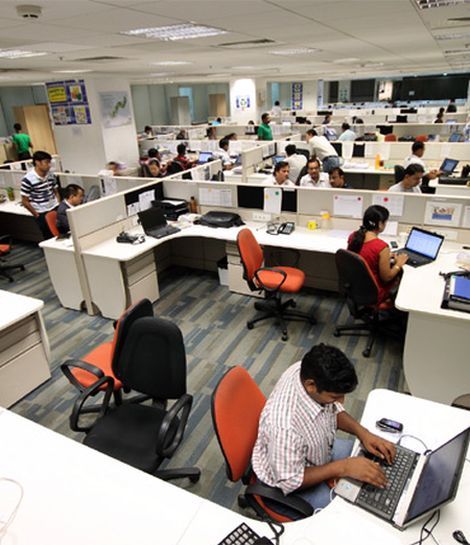 While companies having fewer visa holders in the US seem to be less exposed to rising protectionism, most front-line IT stocks are trading at attractive levels and, to a large extent, factor in near-term headwinds.
While companies having fewer visa holders in the US seem to be less exposed to rising protectionism, most front-line IT stocks are trading at attractive levels and, to a large extent, factor in near-term headwinds.
The writing on the wall is clear.
Given US President Donald Trump’s proposals, the US, the key market for Indian information technology (IT) services companies, will see restrictions that would curtail job losses, real or perceived, caused by software professionals from India.
The Bill introduced recently to push up the minimum wages paid to H1-B employees to as much as $130,000 a year against $60,000 now is a step in that direction.
Not surprisingly, IT stocks have been under pressure in recent times. The stocks of the top three IT companies, namely, Tata Consultancy Services, Infosys and Wipro are trading very close to their respective 52-week lows (just 4.9 to 11.6 per cent higher).
Given the valuations as well as improving financial health of companies (clients) in the US, some reputed market experts have turned bullish on the sector.
“I find tech stocks cheap and the market has become too pessimistic on them. If the US growth is accelerating and wage inflation is rising, then Indian tech companies are in a sweet spot as American companies have to outsource, notwithstanding the policies they would have,” Ridham Desai, head of India Research and India Equity Strategies, Morgan Stanley, told Business Standard recently.
Neelkanth Mishra, managing director, equity research, Credit Suisse, shares a similar view.
“The IT sector has de-rated the most in the past five years. Global cyclical recovery means that their fundamentals should stop deteriorating. There is a fear around issues concerning visa and taxation in the US and these will be key overhangs.”
If the Bill on minimum wages for getting the H1-B visa in the US is implemented as is, it could cause a big blow (500-700 basis points) to the operating margins of Indian IT companies, say analysts tracking the Indian sector.
However, they also say that would be too simplistic a view, given that the Bill has just been proposed and evidence suggests that these Bills take a long time to get processed with some even getting tempered or even dropped in the process.
Depending on the progress on this, Indian IT companies will have some time to realign their business models to any such future changes. Many leading tech companies have stepped up local hiring in the US in recent quarters.
What’s more, if IT companies are able to effectively utilise their huge cash balances for earnings-accretive/strategic acquisitions, it would lend them further support.
Importantly, currently the average wages paid to such US employees are estimated to be 15-20 per cent higher than those of their counterparts deployed on the H1-B visa as they are generally more experienced than their Indian counterparts.
So, raising minimum wages to, say, $100,000 would reduce the attractiveness of hiring India-based workers.
But, it may not be so easy. Analysts believe there may be a shortage of skilled employees in the US to replace the entire H1-B visa-dependent employee base.
There are other criteria by which IT companies can avoid paying high salaries to the H1-B employees.
The first condition is that the job deserves a wage no more than $55,000 per annum and the second is that the company has searched for locals, of whom not enough were available. For this, the company has to give proof.
Thirdly, the company has to ensure that it has not fired any existing employee to hire someone with the H1B visa. IT companies will have to meet these criteria even under the revised guidelines, analysts say.
Companies could also employ techniques that result in increased offshoring, thereby mitigating some of the cost pressures.
Ravi Menon of Elara Capital says: “Nothing in this Bill stops IT companies from sponsoring an H1B visa even at $50,000 per year if they follow these norms.”
However, in the eventuality of visa-related costs rising for Indian IT companies because of the proposed Bill, the companies’ attempts to negotiate with their clients to share the additional cost burden is unlikely to fructify.
Some analysts say the US government could also implement stricter norms on this front via execution orders and other steps. In such an event the impact on the financials of these companies will be sharp in the near to medium term.
While companies having fewer visa holders in the US seem to be less exposed to rising protectionism, most front-line IT stocks are trading at attractive levels and, to a large extent, factor in near-term headwinds.
Given the different scenarios and options, as well as valuations, IT stocks may well prove to be the dark horse of 2017.
Photograph: Reuters.











